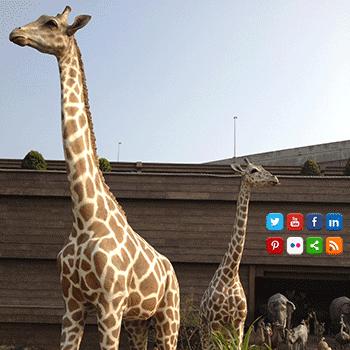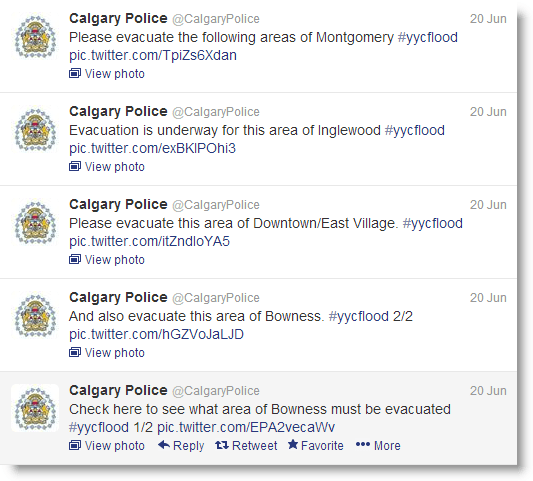Social Media in Times of Crisis
 NOTE: This post was written as Southern Alberta was experiencing the worst natural disaster in it’s history. Unprecedented flooding resulted in mandatory evacuation of 100,000 people from their homes and a state of emergency that is still in effect.
NOTE: This post was written as Southern Alberta was experiencing the worst natural disaster in it’s history. Unprecedented flooding resulted in mandatory evacuation of 100,000 people from their homes and a state of emergency that is still in effect.
It’s been a tough week here in Southern Alberta and while we’re still in a state of emergency, we are slowly making progress. The use of social media has been an essential communication tool to people during this time so I thought it would be interesting to talk about recent observations I’ve made around the role of social during an emergency.
Crisis Management
Twitter is the undisputed star here. With each passing emergency it becomes more and more obvious just how important a role Twitter plays. Minute by minute info on evacuations, road closures, and other critical information can be shared to a large network.
This was especially useful for people that lost power (no internet, no tv, and no radio) and were using their cellphones to understand what was happening. Add to the chaos, on both Thursday night and Friday morning, cellphone service was sketchy making Twitter and Facebook a much easier way of communicating with family members or friends in affected areas.
Both @cityofcalgary and @calgarypolice deserve special mention for their consistent communication on Twitter. Not only did they live tweet media briefings, they responded to individual questions in a pretty short timeframe. Whoever manned those accounts during this crisis deserves a raise, an extra week of vacation, and a basket of mini-muffins. Absolutely fantastic job by both organizations.
When I called my Dad to tell him that Deer Run was next on the evacuation list, he asked me where I got my information. I told him I was tweeting with the Calgary Police Service and advised him to go to twitter.com/calgarypolice. He was amazed at all the information but told me that until I had a more credible source he was staying put. The police returned at 2.30am to evacuate their street and he later apologized but (shockingly) has not signed up for his own account.
There was a glitch for a short time when both accounts exceeded the daily tweet limit and were suspended briefly until Twitter could intervene. Good crisis communications means ensuring that in the event of an emergency, things like daily tweet limits won’t hamper you. Obviously this is not a factor for many businesses, but if you do use Twitter to communicate, make sure you have a plan for it’s use during times of crisis.
Blogs – The city’s main website wasn’t able to handle the traffic so the city posted critical updates on their blog and continually updated it with regular information.
Rounding Up the Masses – The Flood of Volunteers
We’re still in the midst of an emergency, but now that the focus has turned more to recovery efforts, social media has been instrumental in communicating the needs in specific communities with people willing to donate time, money, or pretty much anything.
Facebook and Twitter have been key in this regard. One of the most useful groups I’ve ever seen is the Calgary Clean Up page on Facebook. I’ve also been amazed at the number of businesses and individuals that are helping out in their own special way. Here are just a few examples:
Stop the Scheduled Posts
This is something that I’ve touched on in the past, but it bears repeating. Scheduled posts are great; they allow you to maintain a presence on social media without having to be in front of the computer all the time. Even now as we get back to normal, it’s important for businesses to realize that things can change very quickly. Who would have thought we’d be dealing with a train derailment only a few days later?
Keep it Classy
We’re a tough bunch and I’ve been amazed at the spirit and generosity of almost everyone. However, there are always a few posts that make me wonder what the person was thinking. If we’re conserving water, don’t hold a charity car wash. With traffic restrictions, it’s just not appropriate to encourage people to drive to your location to win an iPad. Don’t be the realtor that promotes “Flood-proof condos” on the 10th floor (yes, it really happened). Emotions run high during a crisis and a failure to understand this is definitely bad for business.
While it’s unlikely that individual businesses will themselves face disaster at the level that we have as a province, understanding how social media is used in times of crisis and why it should be integrated into your crisis management plan is important for any organization.
Finally, though I have not personally lost any of my possessions or property to the flood, members of my family and friends, and some of my co-workers have. I’ve been amazed at the generosity and the spirit of my community, but we still have a long way to go. Any kind of help is appreciated – donations to the Red Cross, time volunteering in the community, even snacks for hard-working volunteers. Check out www.yychelps.ca for info on volunteering or the many different Facebook pages.
Do you have any amazing social media stories from the flood to share? Let us know in the comments!



